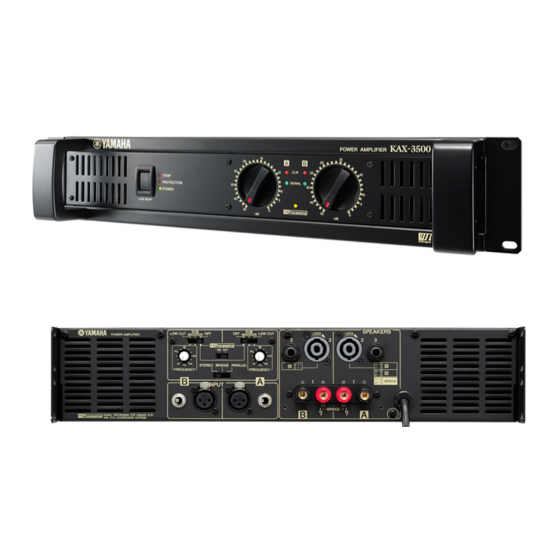- ページ 5
アンプ Yamaha KAX-3500のPDF オーナーズマニュアルをオンラインで閲覧またはダウンロードできます。Yamaha KAX-3500 16 ページ。 Owner's manual

Thank you for your purchase of the YAMAHA KAX-5000, KAX3500 or KAX-2500 power amplifier.
These KAX-series amplifiers fully incorporate Yamaha's renown technological expertise, and offer
high reliability, rock-solid stability, and superb acoustic characteristics-all in a trim, 2U-sized pack-
age.
Features
• With two types of input jacks (balanced XLR and balanced phone) and three types of output jacks
(Speakon, 5-way binding post, and phone), the KAX-series is suitable for a wide variety of applica-
tions and installed systems.
• The unit offers three operating modes: STEREO (where Channels A and B operate independently),
PARALLEL (where the unit outputs a mono source through twin amplifier systems), and BRIDGE
(where the unit operates as a single high-power amp).
• Each channel is equipped with an independent OFF/LOW CUT/SUBWOOFER switch-where LOW
CUT engages a high-pass filter, and SUBWOOFER engages a low-pass filter. With LOW CUT or
SUBWOOFER selected, you can adjust the cutoff frequency from 25 to 150 Hz.
• Each channel has its own SIGNAL and CLIP indicators.
• The PROTECTION indicator lights up-and sound output is automatically muted-whenever the
unit's protective circuitry is operating. The TEMP indicator lights up if the unit is running hot.
• Variable-speed low-noise fans ensure high reliability.
This Owner's Manual covers the three models: KAX-5000, KAX-3500 and KAX-2500 power amplifi-
ers. Please read through this manual carefully before beginning use, so that you will be able to take full
advantage of the amplifier's superlative features and enjoy trouble-free operation for years to come.
After reading through the manual, please store it in a safe place.
Introduction
Contents
Controls and Functions ..................................... 6
Speaker Connections ........................................ 9
Rack Mounting ................................................ 11
Specifications .................................................. 12
Troubleshooting ............................................... 15
Front Panel .......................................................... 6
Rear Panel ........................................................... 7
Speaker impedance ............................................. 9
Wiring ................................................................ 10
General Specifications ....................................... 12
Block Diagram ................................................... 13
Dimensions ........................................................ 14
Current Draw ..................................................... 14
5
